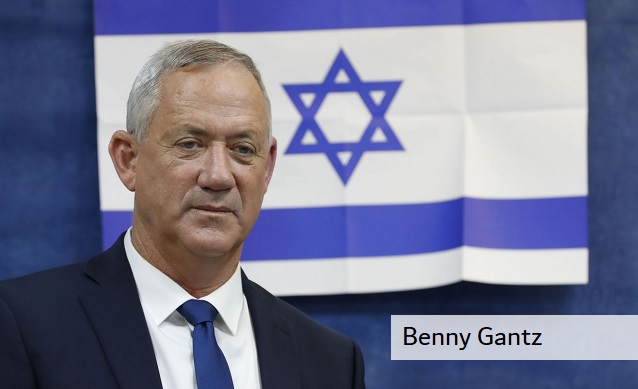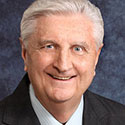Who is Benny Ganz? His Words and Thoughts.
By Barry Shaw

The main speaker on the final day of the ICT World Summit on Counterterrorism in Herzliya on 15 September 2022 was Israel’s Defense Minister, Benny Ganz.
Ganz, a former IDF Chief of Staff, led the country militarily. As a budding future Prime Minister, it is important to know what he thinks and how he would lead the country politically.
In his address he reviewed Israel’s many security arenas claiming that the south is quiet due to Israel’s tough reaction to the Islamic Jihad imposed violence while maintaining the civilian humanitarian needs in Gaza.
The fact that a non-descript terror group was able to launch over a thousand rockets into Israel while developing attack cells in the West Bank under the security cover of the Palestinian Authority was a threat that Israel could not ignore. And so, Israel responded in force in both locations.
Hamas, Ganz said, knows our strength and they increasingly knew the economic and painful price they would pay if they intervened. So, they stayed out of the fight and Israel opened the border to assist Gazans needs, including employment in Israel.
To the east in Syria, Ganz said, Israel continues to curb the transportation and transfer of Iranian weaponry. To the north, Ganz warned Hezbollah chief, Hassan Nasrallah, that Lebanon will pay a heavy price if his terror group attacks Israel’s Karish offshore natural gas rig and sabotages the ongoing US-mediated maritime talks between Israel and Lebanon.
Ganz said ominously that if Hezbollah leader Hassan Nasrallah wants to disrupt the ongoing talks, “he’s welcome to do so, but the price will be Lebanon.”
Ganz said there will be two rigs in the Mediterranean. One Israeli, the other Lebanese. The question, he said, was if there will be an escalation of violence in between.
“We are willing to make an agreement with Lebanon and ready to produce, but if Nasrallah wants to stop this cooperation the first visit we make will be in Lebanon. We are prepared to protect our assets.”
Referring to Judea & Samaria as “the West Bank,” Ganz said this area is more complex. “We see the terror coming from there. Every night we see IDF operations and arrests. It’s always challenging when we go and knock on doors to arrest terrorists,” referring to the safety of soldiers and Israel’s duty not to harm civilians.
He paused to pay tribute to Major Bar Falah who will killed in the process of arresting two Palestinian terrorists the previous day.
Ganz went on, “Counter-terrorism is an integral part of achieving Israel’s strategic objectives. We saw it in Turkey when we, together with the Turks, disrupted several Iranian efforts to hit Israelis in Turkey.”
Naming some of the main challenges facing Israel, Ganz listed Iran, relations with the Palestinian Authority, increasing support for Israel in the international arena, and the development of the Negev and Galilee.
“Iran is a threat to Israel, but Iran is also a world and regional challenge. Who would have thought that Iran would be supplying Russia with technological weapons like drones which Russia is using in Ukraine.”
“Iran’s needs to maintain its regime, and to do this they must maintain instability externally while trying to maintain stability domestically. Stability in the Middle East is against Iranian interests. That is why it is vitally important for us to widen close connections with neighboring countries.”
Regarding the Iran nuclear deal, Gaza said what is needed is a longer, stronger, and broader deal, not one that rewards Iran with $1B to build up its ballistic capabilities. To counter this, Israel needs to build regional structures and create an anytime, anywhere, operational readiness without any pause.
“We continue to stockpile weaponry. Even if it takes five years, we must take no time out in the process,” referring to political or economic restraints.
For the foreseeable future, there is no choice but to compete with Iran.
Turning to the United States from a military perspective, Ganz said that joining CENTCOM was nothing less than dramatic. “We benefit from the combined strength of Israel and the United States.”
Turning to the Palestinian issue, Ganz said he envisioned what he called a “two-entity situation” in which each concentrate on its own needs and economy. He did not elaborate.
Benny Ganz claimed that he represents where Menachem Begin and Yitzhak Rabin meet. Again, he did not elaborate on how it expresses itself save to say that his vision is based on the premise that” no one is going anywhere.”
Referring to his meetings with Mahmoud Abbas, Ganz claimed that he reviewed a Palestinian horizon with him. “I couldn’t expect to find someone as moderate as him,” he said of his meetings with the PA leader in which they discussed how to make a political, economic, and a secure future possible.
He added,
“You can’t lecture me about security. We need wider international support to strengthen our situation with a wider world. We are strong and we are also right. We must improve our public diplomacy, to strengthen our connection with Jews around the world. We must reach out to all strands of Judaism in the American Jewish community.”
Turning to domestic issues, Ganz said,
“in Arab towns, their problems are our problems. We must ensure law and order, fight crime, develop their education ad infrastructure. Most Arab citizens are good citizens. My own doctor is from Kfar Kassam. In Arab towns, people are frightened to go out at night. We need to restore law and order.”
Ganz took a swipe at Benjamin Netanyahu accusing him of causing a rift in Israeli society and deepening it.
Ganz said he respected the Israeli ultra-Orthodox deep faith while asking them to be less isolated from Israeli society and become contributing citizens.
Addressing political problems, he said Israel needs government stability,
“I never thought we would have five elections in four years. Israel strategic objectives must include a responsible government.”
Addressing the death of Israel soldiers such as Major Falah and the AJ journalist embedded with Palestinian gunmen, Ganz said the IDF needs to relook at the order of opening fire.
“We try as much as possible to reduce harm to civilians, but we must also re-examine the need to protect our own soldiers”.
About the American call for an investigation into the death of Shireen Abu Akleh, Ganz said,
“Over a hundred journalists all over the world were hit in enemy engagements with US forces, and nobody opened investigations.”
In response to a question about Israel’s security future, Ganz replied,
“I strive for peace with the Palestinians, but I look reality in the eye. As I strive for peace, I know there is no guarantee, but we have our own resilience and moral strength as a people. We are setting the foundations of collaboration with surrounding countries which may take five years or more to come to fruition.”
NOTE: This report is not published to be an endorsement of Benny Ganz or his political party, but to put on record his own words and thoughts at an important global conference.
©Barry Shaw. All rights reserved.

This article is courtesy of DrRichSwier.com, an online community of citizen journalists, academics, subject matter experts, and activists to express the principles of limited government and personal liberty to the public, to policy makers, and to political activists. Please visit DrRichSwier.com for more great content.

